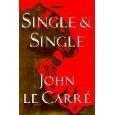What do you think?
Rate this book


416 pages, Paperback
First published March 1, 1999
Iron gates open before them, the escort peels away, they enter the gravel forecourt of an ivy-covered mansion teeming with yelling children, babushkas, cigarette smoke, ringing telephones, oversize televisions, a Ping-Pong table, everything in motion. There is a blushing cousin called Olga, there is Yevgeny’s benign and stately Georgian wife, Tinatin, and three—no, four—daughters, all full-bodied, married and a little tired, and the prettiest and most doomed is Zoya, whom Oliver with a kind of aching recognition takes instantly to his heart. Female neurosis is his nemesis. Add a trim waist, broad maternal hips, a large, inconsolable brown gaze and he is lost. She nurses a baby boy called Paul, who shares her gravity. Their four eyes examine him with forlorn complicity.
“You are very beautiful,” Zoya declares, as sadly as if she were reporting a death. “You have the beauty of irregularity. You are a poet?”
“Just a lawyer, I’m afraid.”
“Welcome,” she intones with the profundity of a great tragedienne.
Yevgeny walks them to a brand new BMW motorbike that stands pampered and glistening on a pink Oriental carpet at the center of the drawing room.. With his household crowding the doorway—but Oliver sees mostly Zoya—Yevgeny kicks off his shoes, climbs onto the beast’s back and revs the engine all the way up, then down again and shines out his delight from between matted eyelashes. “You now, Oliver! You! You!”
Watched by an applauding audience, he hands Shalva his tailor-made jacket and silk tie and springs onto the saddle in Yevgeny’s place; then demonstrates what a good chap he is by setting the building shuddering to its foundations. Zoya alone takes no pleasure in his performance. Frowning at this ecological mayhem, she clutches her son to her breast, her hand protectively over his ear. She is straggle haired and carelessly dressed and has the deep shoulders of a mother-courtesan. She is alone and lost in the big city of life, and Oliver has already appointed himself her policeman, protector and soul companion.

'...what the hell happened next?’ He was so warm! He could feel it! It was here in the room. It was across the packing case from him. It was inside Massingham’s skull and begging to come out – till at the very last second it turned and scurried back to safety. [p. 282]